- Home
- Gail Godwin
Unfinished Desires Page 5
Unfinished Desires Read online
Page 5
“Her, who?” Tildy Stratton was in a foul mood, having been dragged by Madeline out of the country club pool even though it would be closing at the end of this week. Creighton Rivers, the scrumptious lifeguard who had taught her the swan dive and called her “Tantalizing Tildy,” would be leaving town for Emory University. And all for the stupid purpose of putting on a dress with sleeves too tight under the arms (no cap sleeves allowed by Raving Ravenel!) and shoes and socks— Mount St. Gabriel girls did not go bare-legged—to throw away the remainder of a beautiful day sitting on a straight chair in a stuffy little parlor, being grilled—and accordingly prejudged—by the teacher you were going to be stuck with for the whole next year.
“Chloe Starnes. Up front, in Henry’s Jag. At last you two will meet.”
Tildy perked up. All summer she had been rehearsing her first encounter with Chloe Starnes: what she would say to Chloe, and to what desired effect. Henry Vick and Chloe went to the Saturday evening Mass; Tildy and Madeline, and sometimes Mama, went on Sunday. “He’s certainly keeping that little orphan niece wrapped in black tissue paper,” Mama had said. Finally, back in June, Mama had phoned Henry and invited him and Chloe for tea or supper, but Henry had said she wasn’t quite up to it yet; would Cornelia ask them again in a month or so?
“Of course, Henry, I’ll phone you again ‘in a month or so.’” Mama had repeated his exact words back to him in her “social” voice. But after hanging up she had made a sour face. “It will be a cold day in hell before I invite that pompous stick again. Even if he is still officially my brother-in-law.”
More than anything, Tildy was anxious to set eyes on Maud, whose letters and postcards from Florida had grown dippier and more enraging over the summer—the first extended period they had been apart since they became best friends back in third grade. Maud’s mother and grandmother operated the Pine Cone Lodge, which Mama said was just a fancy name for a run-down boardinghouse for traveling salesmen and older tourists on budgets. Maud’s grandmother, a Sluder, was a descendant of old settlers, and that claim allowed some leeway for Maud’s mother to be a divorced woman and for Maud to look gypsyish, even, some guessed, Jewish.
Every summer before this one, Tildy’s father had arranged a special pool membership so Maud could go to the club with Tildy as often as she wanted. Tildy had taught Maud to dive and, under the tutelage of her older sister, Madeline, the girls had begun their apprenticeship in flirting with older boys.
And then suddenly last spring, Maud’s long-lost father, Mr. Norton, whom many of the girls had suspected of not even existing, invited his daughter to spend the summer in Palm Beach with him and his present wife, Anabel.
“It’ll completely wreck our plans!” Tildy had screamed. “We were going to learn to water-ski. Madeline’s already arranged for Creighton’s motorboat on his day off.”
“Oh, Tiddly, I really am sorry. But Granny and Mother say I ought to give it a chance. If they like me, they might offer to help with college. Apparently Anabel’s loaded.”
“Don’t be silly, Maud. With your grades, you can get a scholarship to any college in the universe. You don’t need them. Can’t you postpone it? He’s postponed you long enough.”
That’s when Maud had suddenly turned on her. “You don’t understand. He’s my father. I want to know him. And—and, I mean, maybe he had his own reasons for postponing me, which, by the way, is an extremely cruel way to put it, Tildy.”
It was like having cold water thrown in her face. First the abrupt abandonment of the funny, cherished nickname “Tiddly,” invented by Maud, who was the only one Tildy allowed to call her that. And then being accused of cruelty. Cruelty! By her best friend since third grade.
But there was worse to come, something Tildy could hardly bear to acknowledge as it rolled inexorably toward her like a dangerous wave. All these years Tildy had rested secure in the certainty that she was the most important person in Maud’s life. She had reveled in her role as patron and benefactor. In many ways Tildy had created the Maud who faced her now, a bold new hostility flaming in her cheeks.
Extremely cruel!
In third grade, before Tildy had taken pity on her and embarked on her Magnanimous Experiment, Maud Norton had been nothing: an uncertain newcomer, voice scarcely above a whisper, trailing shady rumors behind her. Her mother divorced (or so she claimed). Returned to town from somewhere in New Jersey to help the grandmother run the Pine Cone Lodge. Down on her luck? Ashamed? Abandoned? She said she was keeping her married name so it would “be the same as my daughter’s.” Maud’s mother had a stuck-up air about her, Lily Roberts who now called herself Lily Norton. She was always like that, Mama said, even back in high school, though she hadn’t gone to Mount St. Gabriel’s. Grandfather Roberts was violently anti-Catholic; he bragged that he had jumped off the back of a Mountain City streetcar when two nuns from Mount St. Gabriel’s boarded it. But now Grandfather Roberts was dead and the grandmother wanted Maud to have the advantages of a Mount St. Gabriel’s education, even if it did cost a hundred and fifty a year for a day student.
But who was “Mr. Norton”? And, as first the months and then the years went by, why did he never show up to visit his daughter?
“Do you think Maud even has a father?” Tildy had asked her mother after she and Maud had become best friends.
“Everybody has a father, Tildy,” said Cornelia Stratton. “Whether he’s in the picture or not. What has Maud said?”
“She doesn’t remember him very well. He sold college jewelry and traveled a lot. But I was thinking, if her father is out of the picture and, say, her mother died, our family could legally adopt her, couldn’t we?”
“What would be the point of that, Tildy?”
“Well, I just thought—”
“Don’t you two see enough of each other as it is? And besides,” Tildy’s mother drily added, “Lily Norton hardly looks as if she’s wasting away. She’s frequently seen dining and dancing with the town’s most eligible bachelors at the Casa Loma Club. If anything, someone else might be adopting Maud before too long.”
However, third, fourth, fifth, sixth, seventh, and eighth grade passed, and nobody adopted Maud. Lily Norton continued to be seen dancing and dining at the Casa Loma with the town’s current crop of eligible bachelors; the former ones had married and begun raising families. “At this rate,” Tildy’s mother remarked, “Lily Norton will be dating the sons of her old dates before long.”
Cornelia Stratton was known for her caustic tongue. The last thing you wanted was to inspire one of her “dry ice” comments, as her daughter Madeline called them. No one was spared, including Cornelia’s husband, Bernard, whom she had renamed Smoky Bear when they became engaged, because he took parties of men bear hunting, living cheerfully and guiltlessly on his inherited lumber income. Even Cornelia’s adored twin sister was fair game, both the living and the dead Antonia. “That’s just like Tony, so eager to get into a damn church on her honeymoon that she runs in front of a van,” Cornelia had raged in her grief after the telephone call had come from Rome. Over the years, her daughters had suffered dry-ice burns so often that they had turned them into humorous scars, each bearing its story. At some point Madeline and Tildy had tacitly decided to regard their dry-ice scars as signs of Cornelia’s close attention to them, proofs of motherly love.
But what had been happening this summer to Maud in Palm Beach with Mr. Norton and the wife, Anabel, who was loaded? Tildy was dying to see Maud in the flesh and make her own conclusions. Norton was far enough down the alphabet for Maud’s interview to be scheduled, like those for Stratton and Starnes, for late afternoon. But first Tildy intended to punish her best friend. Maud’s scatty letters and postcards, when they trickled through the mail slot, had been so disappointing they had verged on insult. Whole dimensions had been left out. And Maud had a jillion dimensions. Tildy had been the one to spot these promises and depths in Maud and coax them into the light for others to admire. But in these stingy summer missives,
for which Tildy had first waited avidly, then reproachfully, and at last angrily—Jesus, it was like Maud was under a spell or had undergone a lobotomy; even her classic, slanting penmanship everybody admired had become debased with circles now floating above the i’s and squatting beneath the far-too-many exclamation points. And, for some reason, she put the names of all her new acquaintances, including her stepmother, in quotes.
Yes, first I will have to punish Maud a little, hit her with a dose of the “shunning treatment” we mastered together and taught the rest of the class to such advantage in sixth grade. She needs to be reminded of all I have done for her and how much more we can do as a combined force. She needs to understand how boring ninth grade would be without me beside her.
“So, little one,” said Madeline, “you want me to pull in behind Henry in the driveway, or should I tootle on down to the parking lot to give you more time?”
“More time for what?”
“My, we are cranky this afternoon. But I forgive you; I used to loathe the registration interview. All I meant was, if I park behind Henry, you can meet Chloe right away and get the introductions over with. Or maybe you want to prepare your tactical approach.”
“Oh, Christ, it’s not that important. Park behind the Jag.”
“Watch all those Christs and Jesuses, honey. Summer’s over—you’re back on the Ravenel firing range. I was only trying to be helpful. I remember what it was like when a new girl came. A mutual appraisal has to take place, like dogs sniffing one another.”
“Well, I certainly am not planning to sniff her. Isn’t she my sort of cousin by marriage—if our aunt Tony was married to her uncle?”
“Oh, by southern standards, everybody’s a sort of cousin. I’d say you can either be one or not, depending on how you all get on.”
In her spaghetti-strap sundress, Madeline looked irresistible when angling the wheel, showing off the swanlike arch of her neck and her tanned bare shoulders. Tildy could have greatly benefited from an inch or so of Madeline’s neck without her big sister being any poorer for the loss.
Ahead of them, Henry Vick, spruce in a panama hat and cotton cord suit, was unfolding his lanky self from his automobile. On the passenger side, the dome of the girl’s head had not moved. Henry sauntered around the rear of the Jaguar, raising his hands in mock alarm as Madeline’s convertible leapt forward and stopped inches from his legs. He opened the door for his niece, who took her time in emerging.
“Hop on out, Tildy, and make the first move,” said Madeline. “I’ll just get my sweater out of the trunk to conceal my brazen arms so the Ravenel won’t take it out on you—but she’ll just have to swallow my bare ankles. Of course, she’ll be teed off when she sees I brought you instead of Mama.”
(“Tell her I’ve got stuff to do in the darkroom,” Mama had instructed Madeline. Cornelia Stratton had a successful studio in town, specializing in social occasions and group photographs. “Today I’m just not up to Suzanne’s registration fervors.”)
Tildy put herself into noblesse oblige mode and stepped out onto the driveway to meet Chloe. Introductions were easier if you pretended you were acting a part in a play. She walked up to the girl blinking at her in the bright sunlight, stuck out her hand, and said, “Hi, I’m Tildy Stratton. I believe we’re in the same class.”
Now, why had she spoiled it with that stupid believe? Chloe would think she was an idiot.
But the girl’s face relaxed and her hand came out and met Tildy’s. She was pale as the moon. She must have spent the whole summer indoors, “wrapped in black tissue paper.” Her cool hand nestling in Tildy’s grasp, Chloe said, not very audibly, “Hi, I’ve been looking forward to meeting you.”
So much for that. Then uncle and big sister took up their parts and the four of them swept as a social unit toward the main entrance, from which two women were just emerging.
“Oh, great galloping Jesus!” Tildy sputtered. The two women were Lily Norton and her daughter, Maud. Maud looked about twenty. She had shot up in height and grown boobs. She was dressed like a model in a sheath skirt and matching jacket with a nipped-in waist and peplum. Her brown hair was cut short in a stylish pixie, and her earlobes were pierced with little gold studs. Worse, Tildy could see that Maud had already seen her, but was pretending—from some ominous, yet-to-be-revealed motive—that she hadn’t.
“At this rate, little one, you’ll be over at Mountain City High with me before the leaves turn,” said Madeline to her sister. “Expelled for profanity. Oh, good grief, it’s Maud.” To Henry Vick, Madeline explained, “That glamour girl mincing toward us is Tildy’s best friend.”
“Oh, yes, Lily Norton and her daughter,” Henry said.
Tildy could have killed Madeline for blabbing that Maud was her best friend when Maud hadn’t even deigned to acknowledge her yet. Chloe was probably thinking, This Tildy must be one big dope.
But Tildy was not about to be made a fool of by the person she had rescued in third grade and practically created from scratch. Maud might have all kinds of subtle dimensions, brought out by Tildy, but Tildy’s inborn ruling powers were very much intact. Once more she slid into noblesse oblige mode and, taking Chloe gently by the elbow, advanced on the mincing Maud and her mother, Lily Norton, looking rather glamorous herself—for a middle-aged woman.
“Maud. Long time no see,” Tildy said brightly. “How was your summer? I hope it wasn’t too hot down there in Florida.”
“Oh goodness, no!” Maud, startled, was already on the defensive. “My father has central air-conditioning, and their house is right on—”
“And how are you, Mrs. Norton?” Tildy pressed on, drowning out Maud’s plaintive “—the beach.”
“Oh, I can’t complain, Tildy,” said Lily Norton in the affected Yankee accent she had brought back from New Jersey. “Too busy, as always. The lodge was filled to capacity all summer. Mother and I were even forced to turn some old clients away. Well, Henry Vick, how’s life treating you these days?” This was said familiarly, as though to recall former intimacies. As a widower, Henry had dated Maud’s mother for a while, then withdrawn. (“She threw herself at him” was Cornelia Stratton’s take on it. “She succeeded in scaring him off local women completely and, I sometimes think, women in general.”)
“Hello, Lily. Hello there, Maud,” said Henry with a little bow to each. “Actually, Lily, I’d have to say I’m about the same as you. Too busy, but I can’t complain. You know Madeline, of course, and this is my—”
“Oh, Madeline and I are old buddies,” Lily pertly acknowledged, though she had totally forgotten to include Madeline in her greeting. That was the trouble, thought Tildy, with underbred people: they never could keep track of all the amenities you had to get through first.
“And this is my niece Chloe Starnes, who has come to live with me. She’s going into the ninth grade, too.”
“Oh, yes,” said Lily Norton, looking Chloe meaningfully up and down. She seemed on the verge of saying something particular to Chloe when Tildy sprang her coup.
“Chloe is the nearest thing I have to a cousin,” she told Maud. “Uncle Henry, you know, was married to my aunt Antonia, and I’ve always wished I had a cousin. I think ninth grade is going to be a really interesting year, don’t you?”
“Oh, that’s for sure,” said Maud, with a fakey new laugh. She offered Chloe a blasé handshake. So far she had not even looked at Tildy. “Just wait till you all go inside that parlor and meet her.”
“Her, who?” Tildy irritably demanded.
“Our teacher. Mother Malloy, from Boston. She’s a knockout. We won’t be wanting to get rid of her anytime soon. Well, we have to run—Mother and I have some shopping to do. By the way, Tiddle-dy, I loved all your letters. I’m sorry I didn’t write back more, but Daddy and Anabel kept me on the go from morning till night.”
Tiddle-dy! The added syllable seemed like a mockery. Maud would be punished for that, too.
“Maud’s father and his new wife just fell in love
with her,” said Lily Norton. “My daughter was a complete success in Palm Beach.”
“That’s not very hard to imagine,” Henry gallantly replied as mother and daughter set themselves in motion to mince off to their next expedition. “Though I know you must be happy to have her home again.”
CHAPTER 5
Mother Malloy’s Ninth Grade, 1951
The morning interviews
SEVEN GIRLS—SURNAMES A through L—from nine-thirty until the noon Angelus bell, followed by chapel and lunch. Day students accompanied by mothers, except for one father, Dr. Galvin, whose wife was in the hospital, about to give birth to their sixth child. Galvin, a general practitioner, also doctored the nuns. He brought his two high-school-age daughters, Josie for ninth grade and Sally for twelfth. He had been to Mount St. Gabriel’s the day before, he told Mother Malloy, to register his two younger daughters in the prep. There was, so far, one Galvin boy-child, who would be ready for first grade at Newman Hall when it opened next year. Josie Galvin, a small brunette with sly eyes, seemed sure of herself and of her father’s regard. Was Josie, perhaps, one of the ringleaders in Mother Malloy’s new ninth grade?
The two ninth-grade Cuban boarders presented themselves as a pair for their interview, as the new girl had so little English; Marta Andreu and Gilda Gomez had come down on yesterday’s train from New York, where their fathers were diplomats. Outgoing Gilda, whose heavily accented English rolled off her tongue in impulsive dashes and tumbles, was returning for her third year. She had been at Mount St. Gabriel’s since seventh grade. Her oversized blouses, she explained, laughing, to Mother Malloy, were always tight by Thanksgiving break, and her father said it was a waste of money to buy two sizes of everything. “At Sain’ Gabriel, Mother, my clothes they begin beeg and then they grow small. Jus’ the opposite of me!”
Marta looked, and was, more mature than her classmates. She had been held back in school in Havana, Mother Ravenel had told Mother Malloy, and during her year of shame at having to repeat a grade had formed an unsuitable attachment. Subsequently she had been sent off to Spain to spend a year with a great-aunt. “I am making an exception,” said Mother Ravenel, “by letting her room with Gilda Gomez, who is a good, cheerful girl and knows our ways. I am allowing them to speak Spanish when they are alone, though that’s generally against our rules. Marta is from a prominent Cuban family, and she has a baby sister who will be coming to us in a few years.”

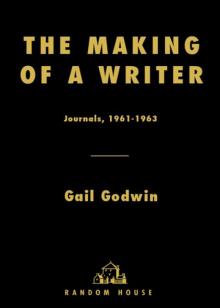 The Making of a Writer
The Making of a Writer The Making of a Writer, Volume 2
The Making of a Writer, Volume 2 Old Lovegood Girls
Old Lovegood Girls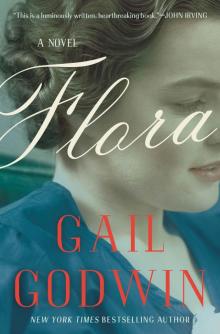 Flora
Flora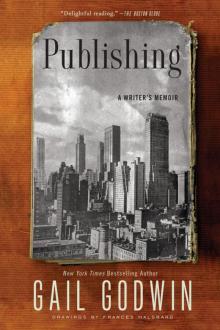 Publishing
Publishing The Finishing School
The Finishing School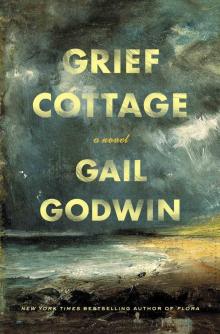 Grief Cottage
Grief Cottage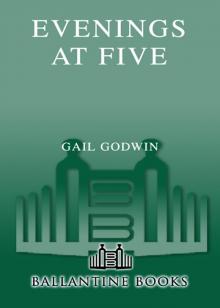 Evenings at Five
Evenings at Five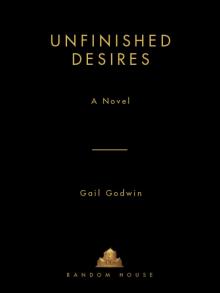 Unfinished Desires
Unfinished Desires